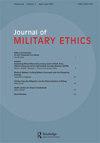JME and Afghanistan Twenty Years On
Q2 Arts and Humanities
引用次数: 0
Abstract
“Fear and I were born twins together,” said Hobbes, alluding to the Spanish armada-borne scare of 1588. The year 2001 birthed a similarly synergistic pair, the attacks of 9/11 and this journal, Journal of Military Ethics, or JME among friends: the dramatic catalyst of at least two wars, that is, and a journal focusing on the ethics of war. “The editing of this first issue was completed before 11 September 2001,” wrote Norwegian Major Dr Bård Mæland in his introduction, “so contributions related to terrorism and counter-terrorism will find their place in the next issue [...].” And the next, he might have added, and the next, and so on for twenty years and counting. Not surprisingly, it is a rare issue of the journal that lacks an article motivated or at least influenced by the wars of this century. At about the same time as JME’s first issue was undergoing final edits, George Crile’s Charlie Wilson’s War appeared in bookstores, recounting how the US had cooperated with Pakistan, Egypt, Saudi Arabia, Israel, and many western nations to support the successful mujahedeen resistance against Soviet forces in Afghanistan. In 1989, the Soviets retreated, and so the story might have ended, but publication came just late enough for Crile to insert the 9/11 attacks along with a book-ending caveat: “To call these final pages an epilogue is probably a misnomer. Epilogues indicate that the story has been wrapped up, the chapter finished. This one, sadly, is far from over” (Crile 2003, 523). Six years later Universal Pictures released Charlie Wilson’s War, the film based on Crile’s book. Screenwriter Aaron Sorkin condensed Crile’s sense of unfinished business into the two-word refrain of an anecdote recited by Philip Seymour Hoffman, playing the real-life CIA operative Gust Avrokotos, whenever Tom Hanks’s Congressman Charlie Wilson naively believes the good guys have won once and for all: “We’ll see.” Those two words capture a widespread sense of uncertainty since 9/11/2001, and perhaps a similar failure to converge on a single narrative will apply to 8/2021 as well. It surprised the literary world when one of the greatest English-language novelists of our time, John Banville, skewered a novel about this century’s wars by another of the greats, Ian McEwan. “If we all have a novel in us, nowadays it is likely to be a September 11 novel. It would have seemed that McEwan was one of the few who might profitably bring his out,” wrote Banville in the process of eviscerating McEwan’s Saturday. “[...] Are we in the West so shaken in our sense of ourselves and our culture, are we so disablingly terrified in the face of the various fanaticisms which threaten us, that we can allow ourselves to be persuaded and comforted by such a self-satisfied and, in many ways, ridiculous novel as this?” (Banville 2005) Hindsight is not just 20/20, as the saying goes; it is emotionally easy compared with the struggle to understand the events of one’s own times and react appropriately. So, Henry V won at Agincourt but died just seven years later, while ultimately the House of Valois triumphed in the Hundred [and sixteen] Years’ War. One can know those things but still get a good night’s sleep in the twenty-first century. Similarly, seeing a great novelist mock another’s reaction to twenty-first-century terrorism and the wars in Afghanistan and Iraq is one thing; watching a new US president diverge so dramatically from his former boss’sJME和阿富汗二十年来
“恐惧和我是一对双胞胎,”霍布斯说,暗指1588年西班牙舰队带来的恐慌。2001年诞生了一对类似的协同效应,9/11袭击和这本杂志,《军事伦理学杂志》(JME),朋友之间的称呼是:至少两场战争的戏剧性催化剂,也就是说,一本关注战争伦理的杂志。“第一期的编辑工作是在2001年9月11日之前完成的,”挪威少校ba·m·æland博士在他的介绍中写道,“所以与恐怖主义和反恐有关的文章将在下一期中找到它们的位置[…]。”下一个,他可能会补充说,下一个,等等,20年,而且还在继续。不足为奇的是,这期杂志很少缺少一篇受本世纪战争影响的文章。大约在《JME》第一期进行最后编辑的同时,乔治·克里尔(George Crile)的《查理·威尔逊的战争》(Charlie Wilson’s War)出现在书店里,讲述了美国如何与巴基斯坦、埃及、沙特阿拉伯、以色列和许多西方国家合作,支持在阿富汗成功抵抗苏联军队的圣战者。1989年,苏联撤退了,所以这个故事可能已经结束了,但由于出版得太迟,克里尔在书的结尾加上了9/11袭击的警告:“把最后几页称为尾声可能是用词不当。尾声表明故事已经结束,这一章已经结束。不幸的是,这一次还远未结束”(Crile 2003, 523)。六年后,环球影业发行了根据克里斯的书改编的电影《查理·威尔逊的战争》。每当汤姆·汉克斯饰演的国会议员查理·威尔逊天真地认为好人已经一劳永逸地获胜时,编剧亚伦·索金就会用菲利普·西摩·霍夫曼(Philip Seymour Hoffman)在现实生活中饰演的中情局特工加斯特·阿夫洛科托斯(Gust Avrokotos)所背诵的一段轶事中的两个字来概括克里斯尔对未了之事的感觉:“我们会看到的。”自2001年9月11日以来,这两个词捕捉到了一种普遍的不确定性,或许2021年8月也会出现类似的情况,即无法凝聚在一个单一的叙事上。当代最伟大的英语小说家之一约翰·班维尔(John Banville)改编了另一位伟大的小说家伊恩·麦克尤恩(Ian McEwan)的一部关于本世纪战争的小说,这让文学界感到惊讶。“如果我们每个人心中都有一本小说,那么现在这本小说很可能是一本关于911事件的小说。似乎麦克尤恩是少数几个可以把他的作品带出来赚钱的人之一,”班维尔在对麦克尤恩的《周六》进行彻底剖析的过程中写道。“[…在西方,我们对自己和文化的认识是如此动摇,面对威胁我们的各种狂热,我们是如此恐惧,以至于我们可以让自己被这样一部自我满足,在许多方面都是荒谬的小说所说服和安慰吗?(Banville 2005)俗话说,后见之明不只是20/20;与理解自己所处时代的事件并作出适当反应相比,这在情感上是容易的。因此,亨利五世赢得了阿金库尔战役,但仅仅七年后就去世了,而瓦卢瓦家族最终在一百一十六年战争中获胜。在21世纪,一个人可以知道这些事情,但仍然可以睡个好觉。同样,看到一位伟大的小说家嘲笑他人对21世纪恐怖主义和阿富汗、伊拉克战争的反应是一回事;看到一位新任美国总统与他的前任老板分歧如此之大
本文章由计算机程序翻译,如有差异,请以英文原文为准。
求助全文
约1分钟内获得全文
求助全文

 求助内容:
求助内容: 应助结果提醒方式:
应助结果提醒方式:


